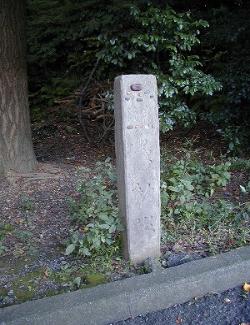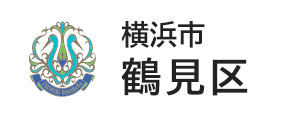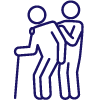- Yokohama-shi Top Page
- Tsurumi Ward Top Page
- Introduction of the ward
- Overview of Tsurumi Ward
- History of Tsurumi Ward
- 21st: Monument of Temakurazaka
Here's the text.
21st: Monument of Temakurazaka
Last Updated July 9, 2024

Monument of Temakurazaka
My dream was a long time ago.
The slope of the Miyokumiyo is Konozaka and Shichiku Kurokawa.
The sound of the fallen leaves of Temakurazaka and bells, Rokuhachi Yoshikawa
On the precincts of Soto sect Motoyama So Mochidera, there is a "Temakurazaka Monument" that tells the footprints of foreigners who visited this area on the eve of Yokohama Port. This monument was built in November 1924 (1924) to commemorate the former Temakurazaka by Sozo Kurokawa, who was the head of Tsurumi Village, and his friend Kanejiro Yoshikawa. Temakurazaka is said to be not the current location, but a slope between Futami Hill, where the bell tower and Sanpoden are located, and the current Tsurumi University Library. Perhaps due to the reconstruction of Sojiji Temple after the Great Kanto Earthquake, confusion during the war, and the growth of trees, a monument whose location was unknown was discovered underground after the war and moved to its current location. Sozo Kurokawa, who served as the priest of Tsurumi Shrine, played a major role in handing down and inheriting folk and local history, such as writing down the events, geography, historical sites and scenic origins of Tsurumi Village before and after the opening of Yokohama in Chigusa. It is a person who played.
Yoshikawa Kanejiro learned from Seiichiro Saito, a bridge engineer at the Tsurumi River Iron Bridge, learned about mixed clay (concrete) techniques that were still rare at the time, and left a monument to convey the history of the local area in various places in Tsurumi with Sozo Kurokawa. is. A beautiful monument elaborately designed, such as arranging colorful pebbles on concrete pillars, which tend to become unfavorable, will guide those who live later in the world on a journey to explore local history. Thinking of the origin of the `` Temakurazaka Monument '' quietly nestled in the deep grove of Sojiji Temple, when asked `` Chigusa '' about `` Temakurazaka origin '', the turmoil before and after civilization revives the sadness of the world. Comes.
―"1854 (1854) Kotora February 16, from Kanagawa Aokicho Coast―
It was the first time since the beginning of the year.
……An official landed on an alien, and a sudden turn to the previous villages due to the taste of Edo, the crackdown, the ferry and the ship were all hidden, "he said. A news that the crew who landed in Kanagawa was sent from the master of Koyasu Village to the master of Tsurumi Village quickly. When the news is sent to the market village owner and touched Muranaka, young people who are bullied by blood are killed, "beating and killing mercilessly."
Time is still an era of isolation. It's just a fine weather since the beginning.
"A big thing!", The villagers were very surprised. The master gathers the villagers and the peasants to control the disturbances of the village, and heads to Mt. Joganji (currently the precincts of Sojiji Temple) to welcome foreigners walking from Koyasu Village to Tsurumi Village.
Kurokawa Sozo's father, Shirozaemon Kurokawa, also went to Mt. Joganji and met a foreigner on Sakashita Road in Minamidai. A large man wearing a black tubular face of the red beard, a black tubular sleeve, a black crotch with a black crotch, a sword-like sword on his waist, and wearing black shoes. The attendant is a haori hakama and a sword. I can't follow foreigners who walk quickly with the desire to go to Edo. Kiyoemon, the role of Koyasu Village's senior citizen, was told by an official that he would like to be accompanied by a foreigner alone because he was a light dress of haori, crotch, and shoes, and Takeshi the wind. Was. Passing through To Terao Village, when a foreigner and Seiemon descending the hill of Tsurumi Village Joganjidai, Minamidai, a foreigner who found a tombstone in the Kusamura on the right side asked Kiyozaemon. Ask something. But I don't know what I'm saying. When Kiyoemon was confused, foreigners turned gravestones, closed their eyes, dig the soil with gestures, imitated burying them, so I guessed that this was asking if they would bury the dead. When he nodded, he said that he was very pleased to understand that the foreigner was finally buried the dead, and he said, "Tepillow Hill" was named.
Mie Saito, Tsurumi History Society
Inquiries to this page
Tsurumi Ward General Affairs Department Ward Administration Promotion Division
Telephone: 045-510-1680
Telephone: 045-510-1680
Fax: 045-510-1891
Email address: tr-kusei@city.yokohama.lg.jp
Page ID: 755-990-417













